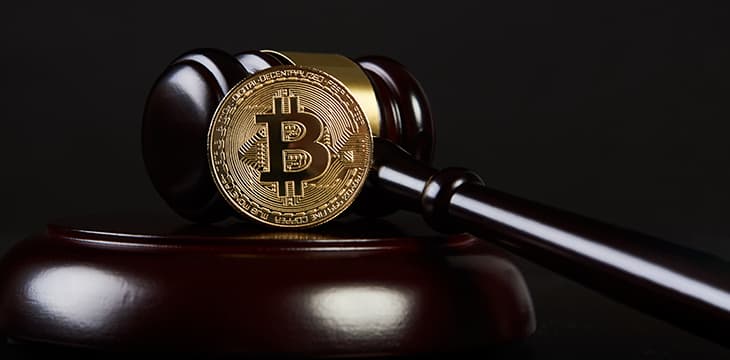
|
Getting your Trinity Audio player ready... |
One of the biggest false prophets of Bitcoin promote the notion that ‘Code is Law’. Those who repeat this mantra are basically saying that due to the potential monetary applications or the ‘decentralized’ nature of Bitcoin, that we somehow no longer need to rely on the existing legal and financial systems of the world in order to do business!
As farfetched as this sounds, this is in fact the founding tenet of entire blockchain projects, the largest of which is Ethereum (ETH). The notion that technology or ‘code’ can serve the role of intermediary businesses, such as legal escrow, banking, and operating markets is nothing more than a pipe dream, and a very far-fetched one made by those with a general misunderstanding of the basic nature of civilized societies. Specifically, the false assumption that intermediary businesses are an inefficiency, and therefore if can be codified and automated away, then they should be.
It should be obvious to most of us, that the Silicon Valley ‘geeks’ are wrong on both counts.
While I’ll leave the latter issue of whether or not intermediaries ‘should be’ disposed of for philosophers to debate, I’ll focus on why intermediary businesses cannot be automated away, without effectively giving away our free will, individuality, and freedom.
This issue has recently become very topical, given Dr. Craig Wright having started legal actions to his legal rights and recover bitcoins which were stolen from him in February 2020. Many false claims have been made that Bitcoin is encrypted and hence a cryptocurrency; however, it is simple to verify that there is no encryption used in Bitcoin and a blockchain cannot function when encrypted. There have been numerous large public thefts of bitcoins in the last decade, in fact, most people remember the cryptocurrency market more for the public scandals and thefts (often portrayed as ‘hacks’) that have occurred than for anything else. This makes what Dr. Wright is doing recently even more interesting, as it has a potential major impact on the industry as a whole, and may serve to correct the biggest incorrect assumption about blockchain technology, if it goes the way Dr. Wright and his lawyers plan.
As a victim of theft or a crypto scam, what if you could recover your lost coins?
This is in essence what Dr. Wright and his lawyers are purportedly claiming. An impossibility most developers and cypherpunks would say. And technically, they would be right if Bitcoin was encrypted. Where files are encrypted there is no way to recover the information contained in the encrypted file knowledge of the private key of the address that controls them. Assuming of course, the coins are at a standard P2PKH output.
But here is the catch: he isn’t doing it via code. He is taking a legal route to recover his stolen property. Bitcoin is a system that operates under the rules and laws that govern our society, and if there is one thing that can trump the ‘decentralization’ technobabble of the system, it is a court order from a major government which can enforce laws globally. For all intents and purposes, this means any developed country’s legal system. When it comes to intellectual property, there are few places in the world that do not uphold the international standards and agreements. Even hardcore BTC purists know this.
In fact, it is their greatest fear. That is the single biggest reason why we have several blockchain variants that pass themselves off as bitcoin today. Because of a belief that bigger block sizes would centralized mining into larger and fewer companies, thereby making them more susceptible to coercion by law enforcement agencies, BTC proponents forked off from bitcoin in Aug 2017 with Segwit and chose to pursue Lightning Networks as their form of scaling instead of one that would just see larger block sizes in bitcoin native.
The mythology around Bitcoin and other blockchain based systems is based on a false claim that the information is encrypted and hence cannot be recovered. The security mechanism of Bitcoin is based on the public dissemination of the hashed header for the block. It is not based on encryption of the information. Consequently, Bitcoin acts analogous lead to a paper based accounting ledger with the ability to update erroneous information.
The developers of the network act as either the agents or direct parties issuing the token. These individuals can change the code setting the recovery of stolen tokens or the enforcement of proceeds of crime orders. The Bitcoin whitepaper specified that the individual corporations managing the blockchain, the nodes or miners act to follow the rules. The Bitcoin whitepaper specifically states that the nodes enforce rules. This is an error that many people make believing that that means nodes vote, the nodes cannot set rules.
Mining operators are at the center of this. As de facto infrastructure providers for the network, as their operations grow larger, they are increasingly exposed and subject to law enforcement, and legal accountability. Being legally compliant is going to become an eventual feature for public mining operations vs private ones. No company that has invested hundreds of millions of dollars in capital equipment would risk ignoring a court order and have their business potentially shutdown and assets confiscated. This is also the reason why many stalwart BTC maximalists have been pushing very hard to have the power of the mining operators checked through a mandate of ‘maximizing decentralization’ and efforts such as using side-chains and Lightning networks, to avoid dependency on the mining operators. However, the underlying blockchain remains linked to the original protocol and any attempts to bypass this using sidechains or lightning simply reallocate the coins associated with a channel.
However, it is in exactly these large mining operators, what the BTC maximalists see as a vulnerability to the Bitcoin system, law-abiding businesses and individuals may come to see as the most compelling feature, if Dr. Wright and his legal team succeed having a court order to retrieve stolen coins enforced. Moreover, if he doesn’t, others will. At the heart of the Bitcoin blockchain is a ledger. The ownership of tokens is recorded on this ledger and where there is a error in a ledger a court is able to issue an order to change this and correct the error. Needless to say, both are possible, as long as developer groups controlling the code and protocol agree to follow the order. If they don’t, this would be seen as a contempt of court and could lead to major sanctions. The nodes or miners act under a unilateral contract and are paid by the developers or issuing party. From this, the majority of the hashpower of the network agree on the blacklisting or redistribution of the coins or have the option to stop mining altogether. Miners enforce rules and such rules would include court orders reallocating ownership. This is analogous to the redistribution of share certificates following a theft of paper certificates. The corporate register could update the register and point to a new certificate number. The ledger will record both the old and the new certificate but only the new certificate would be valid on the network. It is conceivable that they could agree to just confiscate coins at a certain address and pass it back to a different address. There are many possibilities on how this could occur.
Regardless of how it would be technically achieved, the notion that a legal order that would compel ‘decentralized’ mining operations to follow an order to enforce the confiscation of coins would set a precedent that would shake the digital cash industry to the core and conclusively prove that Bitcoin is not a cryptocurrency. A large part of the ecosystem got into the technology thinking that it would allow them to be extra-legal, and to operate outside the domain of laws. Most see this only as a way to protect themselves from an authoritarian government infringing on their freedoms, but some use this cover to deliberately perpetrate crime, and profit from criminal activities, the largest of such was the infamous Silk Road drug market enabled by bitcoin use. If the proceeds of crypto crime could be shown to be confiscated, then criminals would not have any use of bitcoin anymore which would be a huge boon to enterprise adopters who are more interested in the technology as an enabler for new innovative digital economies such as the micropayment industry.
Legal questions abound
Some questions remain to be addressed though, first of which is how a legal action should proceed in the case where the perpetrator is not present or identifiable. If the parties responsible for stealing private keys are not known, can a claim be introduced into a court of law against an unknown person? Certainly not a criminal case, so such a case must lie within the civil legal framework, but would it be a tort if there was nobody to sue? Secondly, the bigger issue is how to address these rights in the global stage of international standards and laws. Since the existing regulatory framework guiding how such a court order would be able to be enforced legally across various jurisdictions is a patchwork with many difficulties, states (collectively) need to develop a unified legal framework in which such court orders can be enforced across the infrastructure providers of the blockchain.
Luckily, U.K. law has provisions for all of these scenarios. English law has long held that the owner of property can recover that property even if they do not know who the thief is. From this, court orders can be issued to return stolen property or for company ledgers to reissue stolen share certificates.
Such a framework would allow for infrastructure providers (developer groups and miners) to have a clear understanding of what their obligations would be to remain compliant. While miners are not a fiduciary or even directly a party in such a dispute, they will need guidance on how and what they should act on, in order to remain compliant within the eyes of the law. This begs the remaining issue, if the miners are not the party with fiduciary obligations to users of a blockchain system, then who is?
Miners provide services under a unilateral contract to the issuer of the token. As such, developer groups may be seen as either a formalized group or a loose partnership of individuals. In either event, developers hold a fiduciary duty associated with the issue of the token.
This question cannot be shirked away with claims of “decentralization” which will have proponents say that there is nobody with such a duty. In the absence of a legal entity or company producing a product, the duty will likely fall on those developers as individuals who contribute to the building of the blockchain, or those who have as a mandate to support and foster the ecosystem, which will likely be the foundations or associations setup to ‘support’ the relevant ‘community’. It will be up to one these entities or the individual developers that comprise them that will have to comply directly with court orders to right any wrongful damages suffered by individuals through use of the system. Thus, it will likely be these entities which will be on the other side of any tort cases which are brought forth in court. Only time will tell, but thanks to this technology we are wading into new legal ground, which will likely be very positive for digital assets and blockchain projects in the long run. Imagine seeing the exit of criminal actors from the ecosystem, allowing real businesses and lawful people to use the technology, which may herald in eventual global adoption.
Rocky road ahead
Unfortunately, as positive as such a change would be for the ecosystem, it would be hard to imagine such an event without a drastic negative effect on the price of BTC, which is fueled largely by those who believe (falsely) in Bitcoin’s extra-legal status and unaccountable nature in the global economy. If and when this happens, it would be a very big reckoning in cryptocurrency circles, and likely cause a massive market shock. However painful the immediate speculator losses may be, such a shift of Bitcoin to be aligned with accepted international laws on property and theft, would be very welcome to large companies and governments looking to use bitcoin technologies, and in the long run, will likely champion in Bitcoin as the global honest ledger and internet cash of future digital economies.

 11-22-2024
11-22-2024


